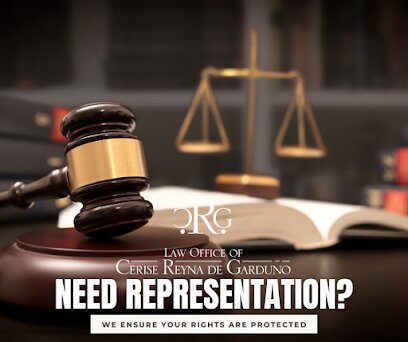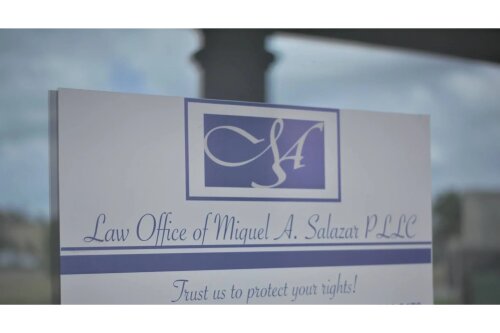Best Work Injury Lawyers in Brownsville
Share your needs with us, get contacted by law firms.
Free. Takes 2 min.
List of the best lawyers in Brownsville, United States
About Work Injury Law in Brownsville, United States
Work injury law in Brownsville is governed primarily by Texas workers' compensation rules as well as federal workplace-safety and anti-discrimination laws. Brownsville is in Texas, which has an employer-choice system for workers' compensation. That means some employers carry workers' compensation insurance while others do not. If an employer carries workers' compensation, injured workers usually receive no-fault medical and wage-replacement benefits without having to prove employer negligence. If an employer does not carry workers' compensation, an injured worker may be able to file a lawsuit against the employer or a third party. In all cases, federal rules on workplace safety, family leave, and disability protections can also affect a claim.
This guide explains when you may need legal help, key local legal points you should know about, answers to common questions people ask in Brownsville, and practical next steps and resources to protect your rights after a workplace injury.
Why You May Need a Lawyer
You do not always need a lawyer after a workplace injury, but legal help can be important in many common situations. A lawyer can protect your rights, explain options, and improve outcomes when claims are disputed or complicated. Typical reasons to consult an attorney include:
- Your employer denies that your injury is work-related or refuses to provide benefits.
- Your employer does not carry workers' compensation insurance and you need to evaluate a civil lawsuit.
- Your claim is undervalued, for example permanent impairment or future medical care is not being offered.
- You suffered a catastrophic injury, such as spinal cord injuries, severe burns, amputations, traumatic brain injury, or injuries that require long-term care.
- You believe a third party caused or contributed to your injury - for example, another driver, a contractor, or equipment manufacturer - and you may have a separate liability claim.
- Your employer retaliates against you for reporting the injury, seeking benefits, or taking protected leave.
- You are unsure which benefits apply to you, how to get medical treatment approved, or how to appeal a denial or low settlement offer.
- Your claim involves complex medical evidence, occupational disease, repetitive stress injuries, or pre-existing conditions where causation is disputed.
Local Laws Overview
Below are the key legal features in and around Brownsville that are particularly relevant to workplace injury cases in Texas.
- Employer-choice system. Texas employers may choose whether to provide workers' compensation insurance. If an employer opts in and is insured, injured workers generally access medical care and certain income benefits through workers' compensation. If an employer opts out, injured workers may be able to pursue a negligence lawsuit against the employer.
- No-fault benefits for covered employers. Workers' compensation benefits for covered employers are typically no-fault - benefits can be paid even if the employer was not negligent. In return, workers' compensation typically limits your ability to sue your employer for most on-the-job injuries.
- Benefits types. For covered claims, common benefits include payment of reasonable and necessary medical treatment related to the injury, temporary income benefits if you cannot work, impairment income benefits for a lasting impairment, and potential vocational rehabilitation services when needed.
- Reporting and deadlines. Texas law expects injured employees to report work-related injuries to the employer promptly. There are strict deadlines for reporting injuries to employers and for filing appeals or contested case hearings with the state regulatory agency. Missing deadlines can affect your ability to get benefits or pursue other legal options.
- Exclusive remedy and exceptions. Workers' compensation is usually the exclusive remedy against a covered employer, meaning you generally cannot file a negligence suit against your employer for a covered injury. There are limited exceptions and separate claims may be available against third parties who share liability.
- Federal protections. Federal workplace-safety rules enforced by OSHA apply to many employers. The Family and Medical Leave Act can protect job rights for eligible employees with qualifying conditions. The Americans with Disabilities Act and state disability laws also may provide protections against discrimination and for reasonable accommodations.
- Administrative agency. The Texas Department of Insurance - Division of Workers' Compensation administers the workers' compensation system in Texas. That agency handles benefit disputes, oversees claims processes, and offers information on rights and deadlines.
- Local courts. If your employer does not carry workers' compensation or a third-party claim exists, state civil courts in Texas handle personal injury litigation. Statutes of limitations usually apply to lawsuits, so acting promptly is important.
Frequently Asked Questions
What should I do immediately after a work injury?
Seek necessary medical care right away, even if the injury seems minor. Report the injury to your supervisor or employer as soon as possible and document when and how you reported it. Keep copies of medical records, incident reports, witness names and contact information, photos of the scene and injuries, and pay records showing lost wages. Acting quickly helps preserve benefits and legal rights.
How do I know if my employer has workers' compensation insurance?
Ask your employer or human-resources department directly if they carry workers' compensation insurance and request the insurer information. You may also contact the Texas Department of Insurance - Division of Workers' Compensation to check coverage status. If an employer does not have coverage, you may have different legal options, including a possible lawsuit against your employer.
If my employer is insured, do I have to prove fault?
No. When an employer carries workers' compensation insurance, benefits are typically available on a no-fault basis, meaning you normally do not need to prove employer negligence to receive medical treatment and wage-replacement benefits. However, you will need to show that the injury or condition is work-related and that the medical treatment is reasonable and necessary.
What if my claim is denied by the insurer?
If your claim is denied, you should get the denial in writing and review the reasons. You can request an explanation, gather additional medical evidence, and file an appeal or request a contested case hearing with the appropriate state agency. Consider consulting a workers' compensation attorney early - they can help with appeals and with navigating administrative procedures and deadlines.
Can I sue a third party responsible for my injury?
Yes. A third-party lawsuit may be possible if someone other than your employer caused your injury, such as a negligent driver, contractor, property owner, or equipment manufacturer. A third-party claim is separate from workers' compensation and may allow recovery for pain and suffering in addition to medical costs and lost wages. Talk to a lawyer to evaluate third-party liability and how a workers' comp claim may interact with other claims.
Will I lose my job if I file a workers' compensation claim?
Federal and state laws prohibit retaliation for filing a workers' compensation claim, but job loss and retaliation can still occur in practice. If you believe you were disciplined, demoted, or fired because you filed a claim or reported an injury, consult an attorney promptly. Document any adverse employment actions, and be aware that different legal protections may apply depending on employer size and other factors.
How are benefits calculated for lost wages?
Workers' compensation wage-replacement benefits are typically based on a percentage of your average weekly wage up to statutory maximums. Exact calculations can vary by jurisdiction and the type of income benefit sought - for example temporary income benefits versus impairment income benefits. A lawyer or claims specialist can help you understand how benefits would be calculated in your case.
What if I have a pre-existing condition?
Pre-existing conditions do not automatically bar recovery. If work substantially caused or aggravated a pre-existing injury or condition, you may still be entitled to benefits for the new impairment or for exacerbations that are work-related. These cases often involve more complex medical evidence and may benefit from legal or medical expert assistance.
How long do I have to take legal action?
Deadlines vary depending on the type of action. Administrative deadlines and appeal windows for workers' compensation disputes can be shorter than civil lawsuit deadlines. In Texas, the statute of limitations for most personal injury lawsuits is typically two years, but you should not rely on general timelines. Contact the state agency or a lawyer right away to determine the specific deadlines that apply to your situation.
Should I sign a settlement offer?
Do not sign a settlement without fully understanding the terms and long-term consequences. A settlement may resolve current claims but could release your right to future benefits, including future medical care or disability payments. Consult an attorney to review any settlement offer, especially if you have an injury that may cause long-term or permanent effects.
Additional Resources
Below are agencies and organizations that can provide information and assistance for workplace injuries in Brownsville and Texas:
- Texas Department of Insurance - Division of Workers' Compensation - the state agency that administers workers' compensation benefits, dispute resolution, and employer obligations.
- Occupational Safety and Health Administration - the federal agency that enforces workplace safety regulations and handles employer safety complaints and inspections.
- U.S. Department of Labor - provides information on federal wage, hour, and leave laws that may affect injured workers.
- Texas RioGrande Legal Aid - a regional legal aid provider that may assist eligible residents with employment and injury-related legal matters.
- Local bar association lawyer referral services - for finding experienced workers' compensation and personal injury attorneys in Brownsville and the Rio Grande Valley area.
- Local medical providers and occupational health clinics - for immediate care and documentation of work-related injuries.
- National Institute for Occupational Safety and Health - for guidance on preventing workplace hazards and occupational disease information.
Next Steps
If you or a loved one were injured at work in Brownsville, take these practical steps to protect your health and legal rights:
- Get medical care immediately and follow your provider's treatment plan. If your employer requires you to see a company-designated physician, document that requirement and seek legal guidance if necessary.
- Report the injury to your supervisor or employer in writing as soon as possible and keep a copy of the report. Note the date, time, and the person you told.
- Document everything - photos of the scene and injuries, witness names, copies of medical bills, records of missed work and pay stubs, and any communications with your employer or insurer.
- Ask your employer whether they carry workers' compensation insurance and for the insurer information. If they do not, consider consulting an attorney about civil claim options.
- Learn and track deadlines for reporting the injury and filing appeals or legal actions. Administrative and court deadlines can be strict and missing them can limit your options.
- Consider a free or low-cost consultation with a local workers' compensation or personal injury lawyer to review your situation and options. Many attorneys offer initial consultations and work on a contingency basis for injury cases.
- Avoid signing settlement agreements or making recorded statements to insurers without legal advice, especially if your injury has lasting effects.
- Use the resources listed above to get more information, file complaints about unsafe conditions, or start an administrative claim if your case is contested.
Act promptly and keep careful records. A timely consultation with an experienced attorney can clarify your rights and help you get the medical care and financial support you need after a workplace injury.
Lawzana helps you find the best lawyers and law firms in Brownsville through a curated and pre-screened list of qualified legal professionals. Our platform offers rankings and detailed profiles of attorneys and law firms, allowing you to compare based on practice areas, including Work Injury, experience, and client feedback.
Each profile includes a description of the firm's areas of practice, client reviews, team members and partners, year of establishment, spoken languages, office locations, contact information, social media presence, and any published articles or resources. Most firms on our platform speak English and are experienced in both local and international legal matters.
Get a quote from top-rated law firms in Brownsville, United States — quickly, securely, and without unnecessary hassle.
Disclaimer:
The information provided on this page is for general informational purposes only and does not constitute legal advice. While we strive to ensure the accuracy and relevance of the content, legal information may change over time, and interpretations of the law can vary. You should always consult with a qualified legal professional for advice specific to your situation.
We disclaim all liability for actions taken or not taken based on the content of this page. If you believe any information is incorrect or outdated, please contact us, and we will review and update it where appropriate.











